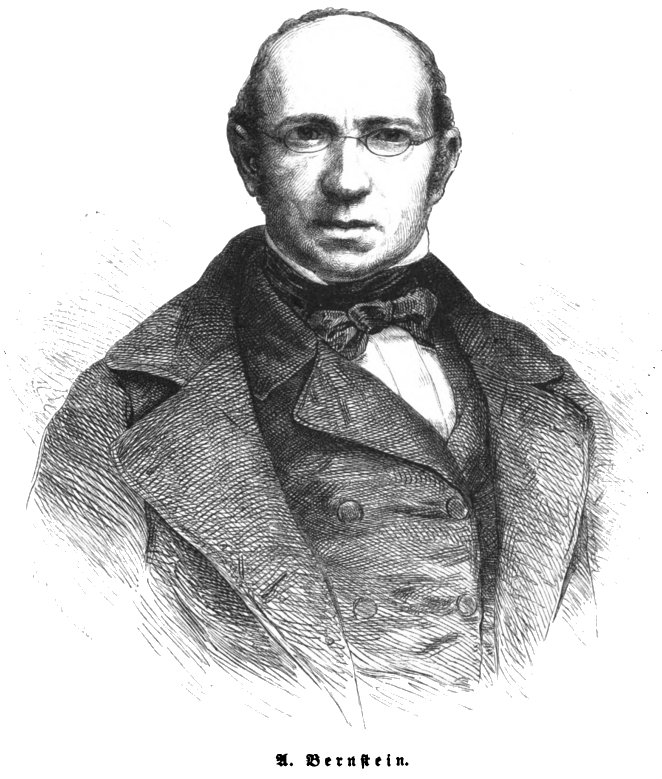5fish
Well-Known Member
- Joined
- Jul 28, 2019
- Messages
- 14,788
- Reaction score
- 5,466
I was listening to an old Radiolab show and it was about Einstein. He read one German science fiction writer a bunch and another writer wrote about a time traveler traveling at the speed of light. @rittmeister one was a Prussian...

 en.wikipedia.org
en.wikipedia.org
Already in the edition of 1855, Bernstein published ideas on space, time and the speed of light which had appeared in the anonymous treatise The Stars and the Earth (German: Die Gestirne und die Weltgeschichte) written by 'an unknown clear-sighted thinker.'[4] It was not until 1874 when a new German edition appeared that the name of the author – Felix Eberty – was made public. When this edition was re-published in 1923, Albert Einstein wrote a preface.[5][6]

As a young boy, Albert Einstein had read a book by Aaron Bernstein, entitled The People's Book on Natural Science. In one section, Bernstein asked the reader to imagine riding alongside a current of electricity as it raced down a telegraph wire. This image stuck in young Albert's mind, and when he was 16, he began to wonder what a light beam would look like if he could catch up to it. As a child, he thought that a light beam would appear frozen, like a motionless wave, if one were racing alongside it. But no one had ever observed frozen light, and he began to wonder why this might be.
https://www.reddit.com/r/PhilosophyofScience/comments/171vwg
Aaron Bernstein wrote a series of popular science books that Einstein was introduced to at age 10 by a student boarder at the family house. Einstein himself later stated that he had read them "with breathless attention".
In one volume, Bernstein describes a thought experiment involving a speeding train and the constancy of the speed of light which likely influenced Einstein's own thought experiment as a 16 year old, and perhaps those in his 1905 special relativity paper. In another volume, Bernstein speculated about the existence of gravity waves. Like Einstein, Bernstein was also eager to tie together all of nature's forces. The philosophy of science underlying Bernstein's writings seemed to mirror Einstein's later scientific realism and trust in the power of rational thought over experiment. For example, Bernstein wrote of the discovery of Uranus: "Praised be this science! Praised be the men who do it! And praised be the human mind, which sees more sharply than does the human eye."
Here is a passage (pp 18-19) from a recent biography of Einstein which describes in more detail, the influence Bernstein's books had on his development. For those who can read German, here is the excerpt from the Bernstein book describing the light thought experiment. An English translation of a different volume by Bernstein can be found here.
This raises the question of how strongly childhood preconceptions influenced the later physics and philosophy of science of Einstein and other physicists.

Aaron Bernstein - Wikipedia
 en.wikipedia.org
en.wikipedia.org
Already in the edition of 1855, Bernstein published ideas on space, time and the speed of light which had appeared in the anonymous treatise The Stars and the Earth (German: Die Gestirne und die Weltgeschichte) written by 'an unknown clear-sighted thinker.'[4] It was not until 1874 when a new German edition appeared that the name of the author – Felix Eberty – was made public. When this edition was re-published in 1923, Albert Einstein wrote a preface.[5][6]

As a young boy, Albert Einstein had read a book by Aaron Bernstein, entitled The People's Book on Natural Science. In one section, Bernstein asked the reader to imagine riding alongside a current of electricity as it raced down a telegraph wire. This image stuck in young Albert's mind, and when he was 16, he began to wonder what a light beam would look like if he could catch up to it. As a child, he thought that a light beam would appear frozen, like a motionless wave, if one were racing alongside it. But no one had ever observed frozen light, and he began to wonder why this might be.
https://www.reddit.com/r/PhilosophyofScience/comments/171vwg
Aaron Bernstein wrote a series of popular science books that Einstein was introduced to at age 10 by a student boarder at the family house. Einstein himself later stated that he had read them "with breathless attention".
In one volume, Bernstein describes a thought experiment involving a speeding train and the constancy of the speed of light which likely influenced Einstein's own thought experiment as a 16 year old, and perhaps those in his 1905 special relativity paper. In another volume, Bernstein speculated about the existence of gravity waves. Like Einstein, Bernstein was also eager to tie together all of nature's forces. The philosophy of science underlying Bernstein's writings seemed to mirror Einstein's later scientific realism and trust in the power of rational thought over experiment. For example, Bernstein wrote of the discovery of Uranus: "Praised be this science! Praised be the men who do it! And praised be the human mind, which sees more sharply than does the human eye."
Here is a passage (pp 18-19) from a recent biography of Einstein which describes in more detail, the influence Bernstein's books had on his development. For those who can read German, here is the excerpt from the Bernstein book describing the light thought experiment. An English translation of a different volume by Bernstein can be found here.
This raises the question of how strongly childhood preconceptions influenced the later physics and philosophy of science of Einstein and other physicists.






